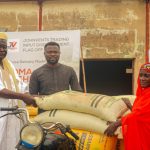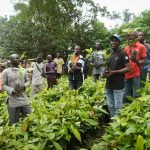Stakeholders have expressed confidence that Nigeria can triple its cocoa production to 900,000 metric tonnes, significantly increasing earnings from $3 billion to $9 billion. This optimism follows a $40.5 million investment deal signed between British International Investment (BII), the United Kingdom’s development finance institution, and Nigerian agribusiness firm Premium Cocoa Products, a subsidiary of Johnvents Group.
Currently, Nigeria produces around 300,000 metric tonnes of cocoa annually, with global cocoa prices reaching $10,198 per metric tonne. The investment aims to expand Premium Cocoa Products’ processing capacity from 13,000 to 30,000 metric tonnes per year, strengthening the country’s position in the international cocoa market.
Speaking at the signing ceremony in Abuja, British Deputy High Commissioner Jonny Baxter described the deal as part of the UK’s commitment to sustainable development in Nigeria. He highlighted its potential to boost job creation, economic growth, and export capacity.
BII’s Head of Nigeria Office, Benson Adenuga, emphasized that the investment would help overcome critical challenges in the cocoa sector, benefiting local farmers and improving Nigeria’s global competitiveness. Adenuga reaffirmed BII’s dedication to supporting Black-owned and led businesses in Africa, ensuring they have access to capital for expansion and innovation.
Dr. Patrick Adebola, Executive Director of the Cocoa Research Institute of Nigeria, noted that soaring cocoa prices serve as an incentive to scale up production. He pointed out that Nigeria has sufficient land to achieve the 900,000-metric-tonne target, stressing that the current price surge has led to significant financial gains for small-scale farmers.
Johnvents Group Managing Director John Alamu described the investment as a transformative step in building a sustainable agribusiness sector. He underscored its impact on empowering farmers, enhancing local cocoa processing, and contributing to Nigeria’s broader economic development.
Chris Chijiutomi, Managing Director and Head of Africa at BII, noted that agriculture accounts for a quarter of Nigeria’s gross domestic product (GDP) and employs over 70% of the population. He emphasized the importance of supporting farmers in adopting sustainable practices and ensuring fair wages, reinforcing agriculture’s role in Nigeria’s economic growth.
With this investment, Nigeria aims to position itself as a major player in the global cocoa market, leveraging increased production and processing capacity to boost export revenues and economic sustainability.










